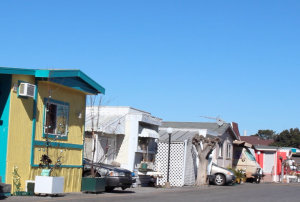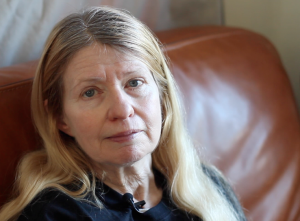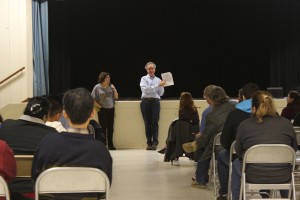
Driving down El Camino Real in Palo Alto, you might not even notice Buena Vista Mobile Home Park. Hidden away behind the Jamba Juice, Baja Fresh and Imperial Spa, children play soccer and ride bicycles together after school, and Spanish song lyrics twang through open trailer doors.
But a year from now, the last trailer-home park in Palo Alto may be gone, and all those residents may have had to move to other towns. The Jisser family, which has owned the property for 26 years, filed an application with the city last November to close the park.
Joe Jisser, the Buena Vista property manager and joint owner of the park along with his parents, is in contract with Prometheus Real Estate Group, to whom they plan to sell the park. Prometheus hopes to redevelop the land into luxury apartments.
Jisser’s parents “are older now,” he reasoned in an interview. “It just came time” when “they don’t really want to manage real estate anymore like this.”
Winter Dellenbach, a retired public-interest lawyer and a resident of the Barron Park neighborhood in which the mobile-home park sits, started a group to find solutions for residents, since the park may close. The group is called Friends of Buena Vista Mobile Home Park. It has about 60 supporters and is growing. Among them is the PTA Council, which oversees Palo Alto’s Parent Teacher Association, advocates for equity among all children enrolled in schools, and brings issues to the City Council when necessary. Friends of Buena Vista is working to ensure the residents can stay in Palo Alto if they wish—at Buena Vista or elsewhere—and that residents are treated with respect through the entire closure and relocation process, should it occur.
“It seemed very wrong to just pretend this wasn’t happening,” Dellenbach said.
Buena Vista currently houses about 400 people, most of them low-income Latino families and almost one third of them children. Many others are elderly or disabled. The problem with the closure is that affordable housing is significantly limited in Palo Alto, and most of the housing that exists carries multi-year waiting lists. And if suitable housing cannot be found in Palo Alto, residents will have to move out of town, pulling their children from the schools they know and quitting jobs they cannot maintain with a long commute.

“If they close the park, I’m kind of out of luck,” said Mary Kear, a Buena Vista resident and grandmother of two who hopes to retire soon. Kear works as a substitute custodian in the Palo Alto Unified School District, earning about $36,000 a year.
“I would like to be able to know that I can stay here and go to work,” Kear said. “I’ve finally seen the light at the end of the tunnel. It took me a long time to get here.”
While finding alternative housing options for Buena Vista’s residents is the highest priority for Dellenbach, losing the history and culture of Buena Vista is also on her mind. The mobile-home park has been around since long before Dellenbach moved to Palo Alto in 1970. The park opened its grounds for travelers in 1926 and now is one of the few bastions of affordable housing in the city—and the last trailer-home park.
In 2001, the City Council deemed the park to be “an essential source of affordable housing in Palo Alto” and agreed with the Jissers to develop strategies for long-term preservation of the park.
Just last week, two law firms — the Law Foundation of Silicon Valley and the Western Center on Law and Poverty — sent a letter to the city arguing that closing the park may in fact be illegal for that very reason.
“In any other neighborhood” in Palo Alto, Dellenbach said, “if this were Professorville or Crescent Park or Green Meadow, and you told people that 400 of their neighbors were going to just disappear, people would just be up in arms,” Dellenbach said.
Many community members are up in arms, and Dellenbach is one, who said the closure of Buena Vista and the displacement of residents to other towns would be significant for Palo Alto. “The sheer scale puts it in a different category,” she said, comparing the move to the internment of Japanese Palo Altans during World War II and to the removal of about 90 homes for the development of Oregon Expressway in the 1960s, neither of which displaced as many Palo Alto residents as this move would.
Beyond scale, forcing the residents to move to neighboring towns would deprive Palo Alto of a large chunk of the city’s ethnic, cultural and economic diversity, Dellenbach asserted, a reason many residents moved to this area in the first place.
Nancy Krop is one of them. “We chose to live in Barron Park because we know of this diversity,” Krop said. She’s Vice President of Advocacy for the PTA Council and the mother of a 10-year-old student at Barron Park Elementary, where children from Buena Vista make up about 12 percent of the school. “So it’s not just a harm to Buena Vista; it’s a harm to the classmates who are getting so much enrichment from the cultural and social economic diversity.”
Buena Vista parents moved to Palo Alto for educational reasons as well. “Everybody wants their kids to have a good education,” Kear said. Palo Alto “is the best place.”
Erika Escalante, a fellow Buena Vista resident who is also working with Dellenbach, grew up in Palo Alto and attended Gunn High School before earning a bachelor’s degree in business from Notre Dame de Namur University in Belmont, California. Now, she works as a department coordinator for the Peninsula Circle of Care program for the elderly at the Palo Alto Medical Foundation.
At Buena Vista, her neighbors include her parents, two younger brothers, her sister’s family, her brother-in-law’s family and her cousin’s family. She lives with her husband and her son, who is enrolled at Barron Park Elementary. It’s not just their home that’s at risk; it’s their entire community.
Her first grade son keeps asking her, “Why do we have to move?” But she doesn’t have an answer for him yet. (Story continues below.)
In an interview, Mayor Greg Scharff called this whole process “unfortunate,” saying that “The residents are part of the community, and I don’t want to see them lose their homes.”
Donald Barr, a professor at Stanford University and the founder of Community Working Group, a nonprofit organization combatting homelessness in the San Francisco Bay Area, emphasized that the property owners’ rights should be upheld. If they want to sell the land they own, they should be allowed to sell it.
But, in his work with Dellenbach and Friends of Buena Vista, Barr has identified ways in which the Jissers could sell the land and the residents could have the option of remaining in Palo Alto.
One option is that a buyer other than Prometheus could purchase the park and maintain it as it is. That way, the residents wouldn’t need to move.
City staff has made attempts to look for an alternative buyer. A report filed in December states that, “staff continues to try to contact a non-profit housing organization in Sacramento which has intervened in mobile-home closures or conversions elsewhere in California, but staff has not been able to make contact to date.”
If Prometheus does indeed purchase the land and close the park, as they are in contract with the Jissers to do, Dellenbach said another option is that some of those new apartments could potentially be set aside as affordable housing for expelled Buena Vista residents. Some apartments would have cheaper rents than the others and could be offered to those who already live on that land.
Property manager Jisser said he is not part of this process and could not comment on the likelihood of any new apartments being made affordable for low-income families.
But the Jissers may partner with Prometheus to develop the property, in which case they too would have a financial stake in the new development. Redeveloping the mobile-home park land with Prometheus is “something that we’ve been talking about,” he said. “But we haven’t really decided on how we’re going to move forward with that.”
While the developers are figuring out how they want to proceed with the development of the land, 400 residents are wondering where their homes will be next year. Community members are trying to help them figure that out.
Barr and Dellenbach are advocating another new-apartment option: Community Working Group is in the process of finishing a brand new affordable housing development with Eden Housing, which offers housing and services for lower income, seniors and disabled people. The property is located beside Whole Foods at 801 Alma Street. It’s to include 50 units of one- to three-bedroom apartments and is to be completed this summer. It would not be able to fit all 400 displaced Buena Vista residents, but it could theoretically house some, according to Barr.
The new residents of the 801 Alma property will be chosen by lottery though, according to Eden Housing. No preference could be given to Buena Vista residents.
Before pursuing any of these options and reaching out to the necessary organizations and companies, like Prometheus, Barr and Dellenbach said they first need to talk with current residents about where they even want to live.

Barr announced the various possibilities at a meeting between residents, their attorneys and their supporters in early February. He handed out packets of information and answered a handful of questions, but he did not request direct feedback from residents at that time.
Barr and Dellenbach said in an interview after the meeting that they are currently trying to figure out a way to get that vital feedback. Barr has charged the students in one of his classes at Stanford with investigating the issue. The class is an education class on the wellbeing of children in immigrant families. Students have gotten to know some Buena Vista residents and may help the residents’ attorneys in collecting information on where residents might want to move, but as yet they have provided no results.
And anyway, there’s still a chance the park may not close after all, if closure is deemed illegal. Barr said in an interview last week that legal complications surrounding the closure of the park “will be hanging around for a while.”
